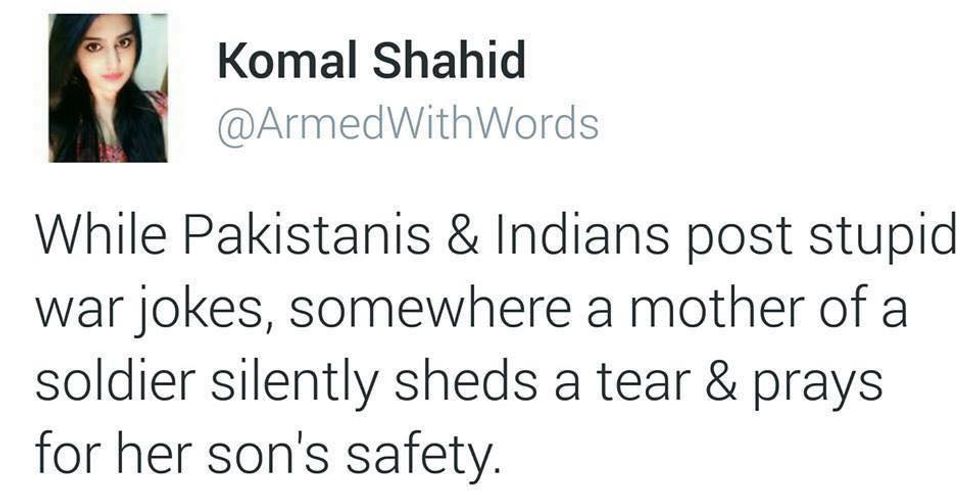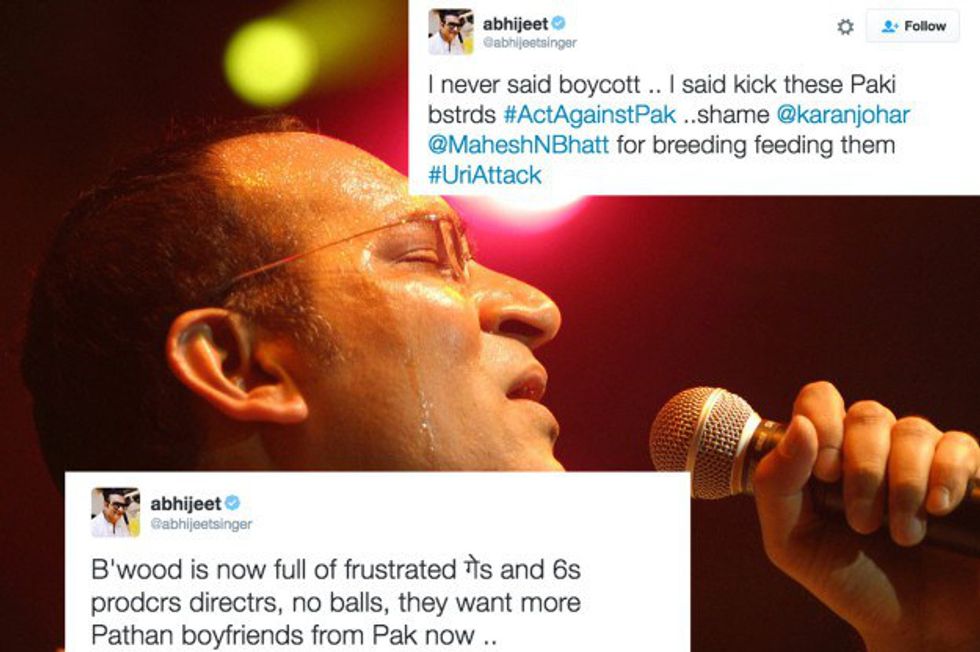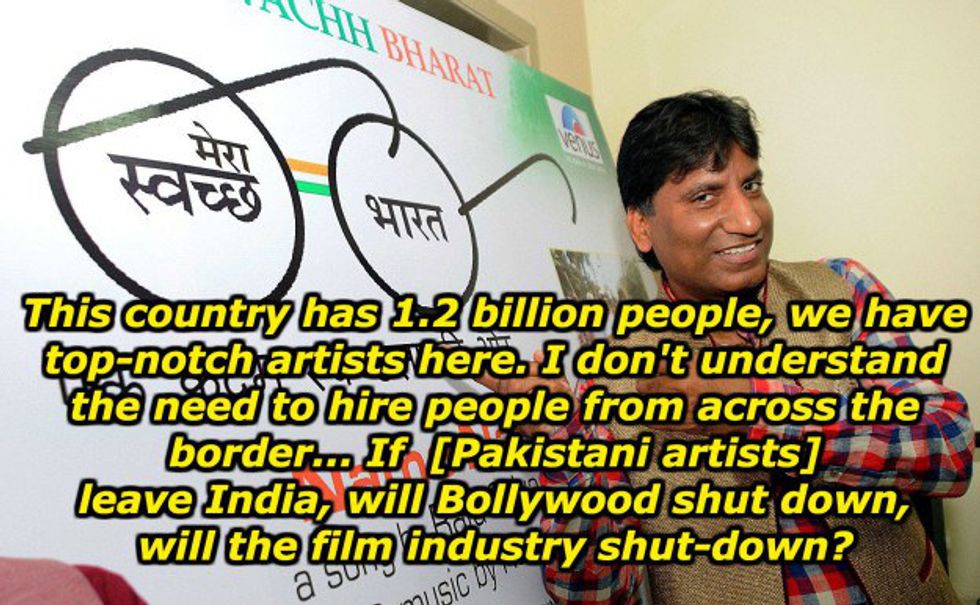It seems that those of us who were hoping for tensions between Pakistan and India to decrease despite the problems in Kashmir will have to continue waiting for a resolution. Since the beginning of September, relations have gone from bad to worse. Most recently, in response to the Uri attack in Kashmir on September 18th, 2016, the Maharashtra Navnirman Sena, a Maharashtrian nationalist party, threatened all Pakistani artists to leave the country within 48 hours or face consequences. And the Indian film association has placed a ban on Pakistani artists coming to India to work. And while the Pakistani government has not issued an official ban on Bollywood films, several large theaters in Pakistan have already stopped screening Bollywood films in protest to India's ban. These bans highlight the pathetic inferiority complex that governments of Pakistan and India have with one another. They can’t live without constantly stirring up problems. It shows that they are incapable of maturely figuring out a resolution.
As I stated in my previous article last week, just like the eternal battle over Kashmir, this ban on both fronts has been done out of pride and arrogance. It is clear that the Indian government and media is fully aware that Pakistani actors are not harboring terrorists nor are they promoting terrorism in any way, and that banning them will do nothing to curb the attacks. They issued this ban out of arrogance and also to portray Pakistanis as enemies to the citizens of their nation. Pakistani media and cinema owners, in response, proved no more intelligent or rational than their Indian counterpart. They took the bait with ease and increased the antagonism between the citizens of the two nations. This is a plain tit-for-tat mentality, and the victims are the youth who get thrust with the same bias that the previous generations have been fed.
Keep in mind, the governments of Pakistan and India have been invested in keeping the citizens of the two nations at each other's throats for nearly 70 years. They want to portray each other as rivals, again for reasons I stated in my previous article. Promoting anti-Muslim and anti-Hindu sentiment is not only how they keep hostilities going, but also how they garner support for their actions from the common people. Their biased portrayal of one another is how they keep their patriotism alive for multiple generations. It is as if in order to be a patriotic Pakistani or Indian, you have to dislike the opposing nation and if, God forbid, you do like the “enemy” then at the very least the needs of your own nation have to come first. A Pakistani or Indian who loves their nation cannot love the opposing nation equally. And to remain neutral is to automatically support the enemy.
There have been a significant number of people on both sides who have condemned the actions of India and Pakistan with regards to both the potential war and the bans. In India, a number of Bollywood actors shared their own opinions regarding the course of events. Many were against the ban, since they saw that there was no basis for it, and were irritated by the hate being promoted by the MNS. Actor Salman Khan spoke in favor of Pakistani actors and called for the president of the nationalist party Raj Thackeray to back off, for which he received significant backlash. Director Mahesh Bhatt and veteran actor Om Puri also stood with the actors from Pakistan, with Bhatt pointing out that we should be trying to eradicate terrorism rather than compromising on the prospects of negotiation and peace. In Pakistan, cricketer Shahid Afridi has tweeted for peace between the two nations and has pleaded with both governments to refrain from engaging in another war, pointing out how catastrophic war is for people on both sides of the border. Other Pakistani celebrities have also spoken out for peace, understanding that war will only lead to more senseless loss of life.
Unfortunately, where we have voices of reason we also have embarrassments on both sides of the border amongst the film industry who, instead of doing their part to end this everlasting antagonism with their influence, have decided to throw gasoline on an already burning fire. In India, comedian Raju Srivastava commented that he doesn’t “understand the need to hire people from across the border…”. Singer Abhijeet Bhattacharya, who has always promoted anti-Pakistani sentiment, has called for kicking the “Paki bstrds” out, and even went so far as to call Salman Khan an unpatriotic Indian, saying he was ashamed to show loyalty for India, for speaking out against the ban. The Shiv Sena, another nationalist party, have said that he needs to learn a lesson on national pride, as if being a patriotic Indian means supporting Pakistan. The Indian media has also been less than supportive, portraying Salman Khan as unpatriotic and a traitor and also mocking Shahid Afridi for even considering peace as a possibility between the nations. It is becoming clear from both sides that the media does want war, because they are doing all they can to complicate matters between Pakistan and India. On the Pakistani border we have disgraces (yes, they are disgraces!) like Faisal Qureshi (who spoke out against a film called Phantom last year, and gave a hateful rant about India) and Hamza Ali Abbasi, who for years has spoken out against Bollywood and Indian influence, decided to make matters worse by calling for Pakistan to boycott Bollywood. People like this on both fronts are what bother me the most because they have a significant influence on the youth of both nations, and the more support they get for spreading hateful rhetoric like this, the more chances we have of passing on this feud to the next generation, continuing the vicious cycle we have been engaged in since 1947. The inherent idea that the two nations are different and should only look out for their own is what fuels the rivalry. It is rotten fish like this who spoil the whole pond.
What I find amusing (and irritating) is that the citizens of Pakistan and India are both aware that their governments are severely flawed; lack of education and poverty amongst other issues have plagued them for decades and many people regularly condemn their governments, especially when comparing them to nations such as the United States and the UK. But of course, once the comparison comes between Pakistan and India, the citizens are quick to change their tune, all in high praise for their government and military for protecting them against the “enemy”. For 364 days out of the year, they will criticize their governments for their lack of adequacy in addressing the real problems, but that one day of praise and patriotism will be when asked about actions against Pakistan and India respectively.
Unfortunately, this is all to be expected. The Pakistani and Indian governments and media have proven incredibly easy to manipulate and turn against one another. Veteran actor Naseeruddin Shah said it best when he said that Indians are being brainwashed into believing that Pakistanis are the enemy. The same is true for Pakistanis. Both Pakistani and Indian governments have systematically implemented biased education systems against one another, and then the media and military keep it going. This is why the government politics and military should be on one end, and the youth of both nations need to be on the other, because these disputes between Pakistan, whether they are over Kashmir, over banning artists or films, are never going to end. Both governments are too caught up in their own egos, trying to one-up each other. Pakistani and Indian governments will do their dance over Kashmir for eternity, because both of them just want to outdo each other. It isn’t even about the good of the Kashmiri people anymore; it is about winning, and instilling the concept that the people of India and Pakistan are too different to live together in peace. In addition, as I have stated before, war and enmity are familiar to them; they don't know anything else between one another. They're too caught up in the cycle to consider breaking it. Changing this dynamic is too foreign for them.
But we (the citizens) don't have to follow their lead. If anything, they have shown us how not to interact with one another. We don't have to keep the baseless cycle of hostility and antagonism going. This entire call for banning Pakistani artists and Bollywood films, it is just another step further from achieving peace and good relations. And any act that drives the nations further apart should be condemned on both fronts. It is especially important to discourage our youth from engaging in the antagonism because we want to end this here, with our generation. We don’t want to make the same mistakes our predecessors made. We must focus on what unites us rather than the one factor that has kept us apart. I am confident that with efforts on both sides, we will be able to tear down this arbitrary wall that has divided us for 69 years.














































